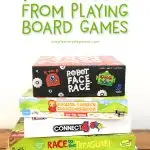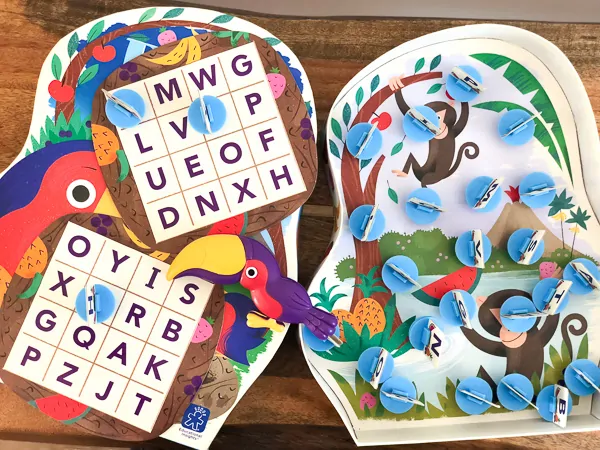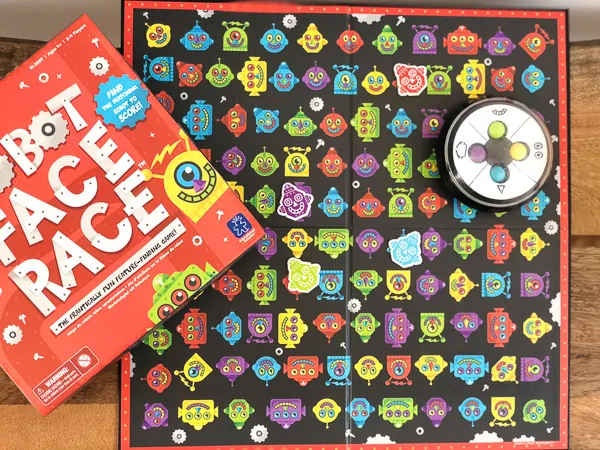Inside: Learn about all the board game benefits kids can gain while playing their favorite games. Plus, discover the best board games for kids here.
Board games are a super-sneaky tool for developing a myriad of skills in children of all ages.
Children as young as 3 can start playing preschool board games with the assistance of an adult or older child.
Thanks to a sudden resurgence of popularity, there are games out there for every interest and age level.
Most importantly, though, board games are fun, and they are excellent for family bonding no matter what age your kids are.
Here are seven great reasons to shut down the electronics and dust off the dice!

This post contains affiliate links for your convenience. You can read my full disclosure here.
Board Games Teach Kids How To Take Turns & Be Patient
One of the hardest things for any child to do is to wait their turn.
It is, however, a skill that needs to be mastered to function as an adult. No matter how badly we want to, adults can’t push past others in line at the bank, or their boss during a meeting to say what they want to say.
Board games build this skill by having players take turns, while the wait is typically brief. The child is rewarded for their patience with their own turn.
The repetition helps reinforce the behavior, and voila, taking turns is quickly mastered!
Board Games Reinforce Math Skills
Most games involve some form of math.
Related: 11 Best Math Board Games For Kids To Make Practicing Fun
Most require counting – be it colored squares, pips on the dice rolled, or the number of cards. More complex games require score to be kept, money to be managed, or wagers to make.
Resist the temptation to add the score for older children – and don’t let them use the calculator app until they’ve done the work on paper for maximum benefit.
Don’t forget to check their math…especially if they’ve beaten you by a few points!
Board Games Build Literacy Skills
It doesn’t have to be a word game to build literacy skills.
In Monopoly, for example, one must read the rules, the names of the properties, and the Chance and Community Chest cards.
Other games are sure vocabulary builders simply by their nature alone. Don’t Say It, for example, requires a player to creatively describe a word without using any of the taboo words listed on the card and get teammates to guess what it is.
If you’re looking for literacy specific board games for your children, check out the best alphabet board games to teach preschoolers the ABCs.
Board Games Help Kids Learn How To Use Logical Thinking
Thinking ahead and planning are very advanced skills. Practice them by playing games that require strategy.
Complex board games require players to think of not only their current move but future moves and responses of other players.
Like many skills, this will need some guidance from older players, patience, and lots of practice. It’s well worth it though – logical thinking skills help in nearly every aspect of life, from planning a grocery list to deciding a major in college.
Board Games Help Kids Learn To Win – And Lose – Gracefully
Winning and losing can both be a tricky skill for kids to learn.
Putting it in the safe context around a dining room table can be a much better place to practice this than on the field or when audition results are posted.
While it can be tempting to let your child win every game to avoid tears, it can provide unrealistic expectations when they play with peers.
End each game with a handshake or hug, and the words “Let’s play again!” can soften the tough blow of a close game lost.
Board Games Are A Safe Place To Learn About Actions & Consequences
One major complaint about society is that younger generations have a hard time with accountability.
“It’s not my fault!” is a battle cry of many young adults.
One way to avoid this is to play board games, especially ones that require less chance and more strategy.
What happens if you pull that Jenga plank?
Is it a safe move, or will it end in disaster?
If you put your chip in that location, what will your opponent’s action likely be?
Talking younger players through the possible choices will be necessary but children should pick up on this skill very quickly.
Board Games Foster Teamwork
Not every board game out there is every player for themselves.
Cooperative board games are a fantastic way to help a child that struggles with losing or playing fairly.
Disney’s Eye Found It puts players against the clock, Castle Panic puts the players against a horde of monsters storming the castle.
Even if you only have games that typically have one winner, most have versions of team play in the rules.
Even if they don’t – it’s easy enough to turn most games into a team effort.
Bonus Reason: Board Games Bring Families Together
Board games bridge generations.
Whether it’s a family card game of Go Fish that includes everyone from Great Grandma to the preschooler sitting on her lap or a weekly tradition of a family game night after dinner on Saturday, games are just meant for family bonding!
More Fun Kids’ Activities:
- A Colorful PJ Mask Craft Your Little Ones Will Flip Over
- Celebrate National Star Wars Day With These 40+ Ideas For Kids
- Your Children Will Love These Free Disney Color By Number Printables
Top Rated Board Games For Kids:
 Yeti in My Spaghetti Family...Shop on Amazon
Yeti in My Spaghetti Family...Shop on Amazon  Peaceable Kingdom Hoot Owl ...Shop on Amazon
Peaceable Kingdom Hoot Owl ...Shop on Amazon  Educational Insights The Sn...Shop on Amazon
Educational Insights The Sn...Shop on Amazon  Spin Master Games Hedbanz, ...Shop on Amazon
Spin Master Games Hedbanz, ...Shop on Amazon

Sam is the crafter and founder of Simple Everyday Mom. She has been featured in Oprah Mag, Good Housekeeping, The Spruce Crafts, Country Living, The Bump and more. Read more.



